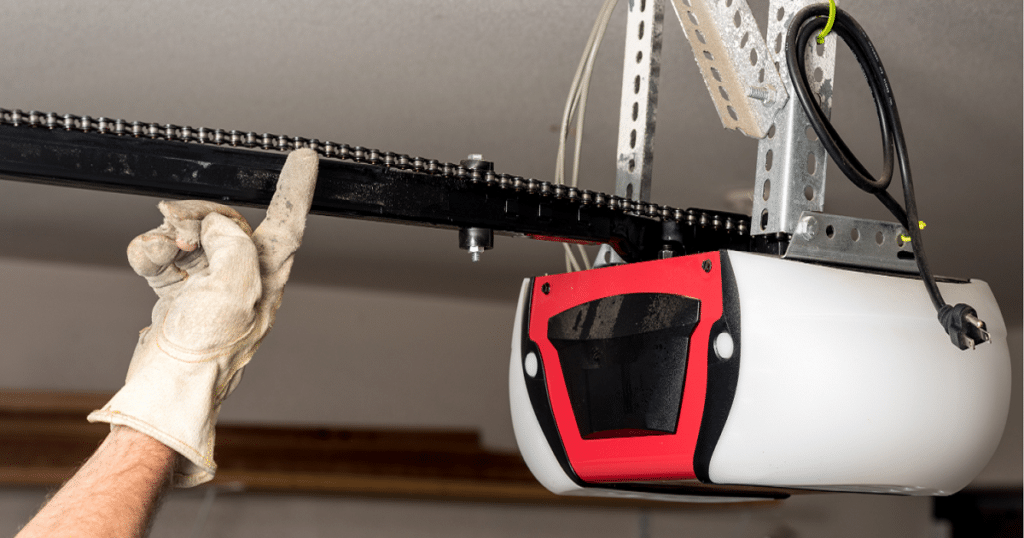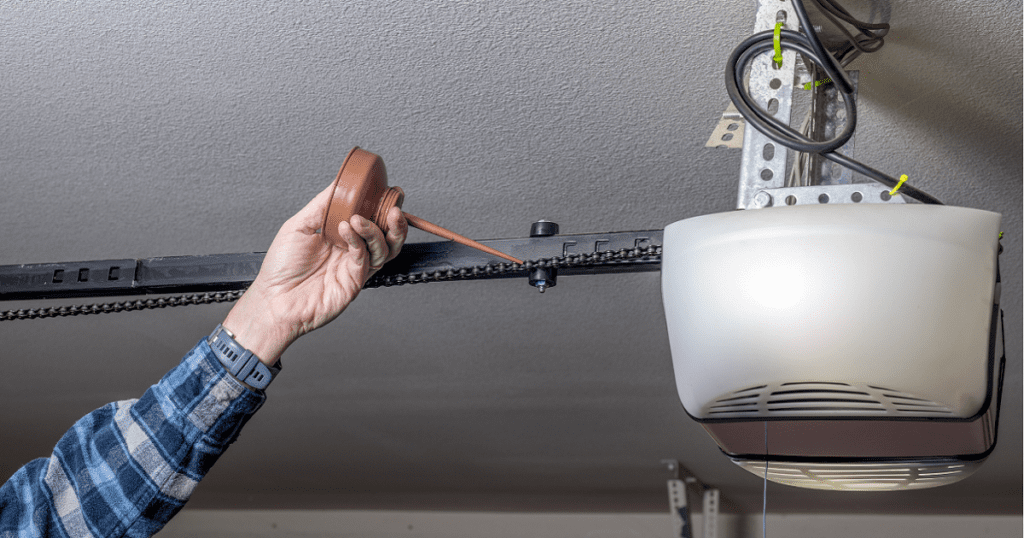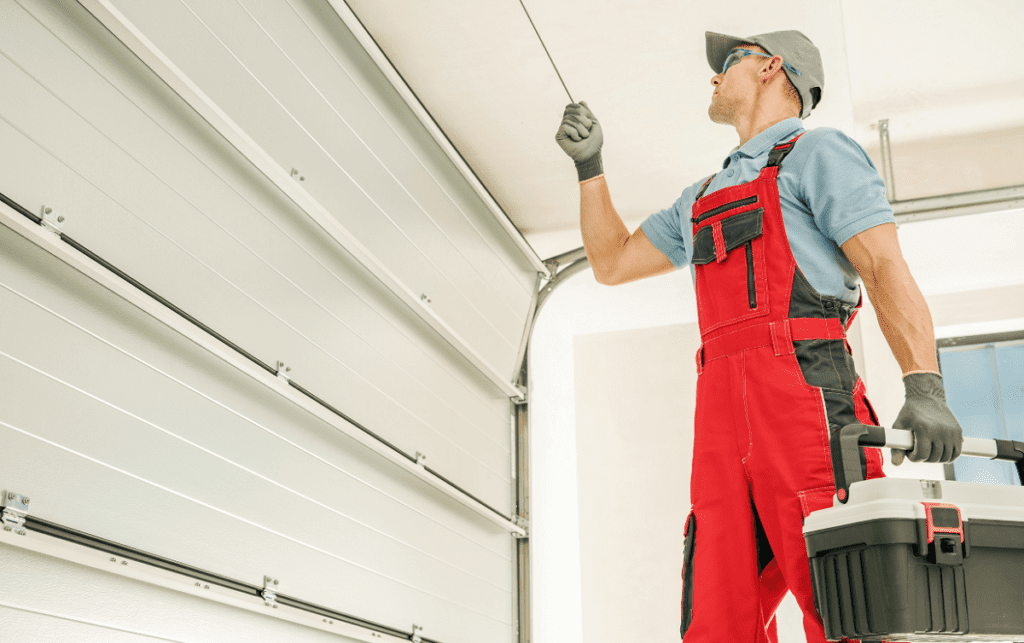
Garage doors are a crucial part of your home’s security and protection. They provide easy access to your garage and act as a barrier between your home and the outside world. But like any mechanical system, garage doors also require maintenance to function correctly.
Garage door lubrication is an essential part of that maintenance. Lubricating your garage door helps to prevent unnecessary wear and tear on its moving parts.
It ensures that the door opens and closes smoothly without creating loud, screeching noises or otherwise disturbing your family or neighbors. Additionally, proper lubrication can prevent rust buildup on metal components, ultimately extending the lifespan of your garage door. But what is the best way to lubricate garage doors?
Overview of Lubricant Types
When it comes to choosing the right lubricant for your garage door, there are several options available on the market today.
- Silicone-based lubricants are popular due to their non-toxic nature while providing long-lasting results with no residue buildup.
- Lithium-based grease is also frequently used as it is resistant to water and doesn’t attract dirt as quickly as other types of grease.
- Graphite powder can be used effectively for track lubrication in particular but should not be used in place of traditional grease products for hinges or rollers since it tends to clump up over time, forming a sticky residue that actually attracts dirt and debris causing more harm than good.
Remember that factors such as climate (e.g., high humidity) may impact the performance of certain lubricants, so keep this in mind when making a final decision based on user reviews and recommendations for garage door lubrication that consider local conditions you might face when choosing an option that will work best for you.
The Basics: Choosing the Right Lubricant
Different Types of Lubricants and Their Properties
Choosing the right lubricant for your garage door is crucial to its optimal performance. There are several types of lubricants available in the market, but not all are created equal. The most commonly used lubricants for garage doors include silicone, lithium, and graphite.
- Silicone lubricant is a great option for those seeking long-lasting lubrication products for garage door hardware. It is resistant to extreme temperatures and protects against rust and corrosion. However, it is not recommended for use on plastic parts as it can cause damage over time.
- Lithium grease, on the other hand, provides excellent lubrication for metal components such as hinges, rollers, and springs. It has a high resistance to water and helps prevent rust buildup. However, it may harden or break down over time if exposed to extreme temperatures.
- Graphite lubricant is one of the best options for reducing friction between metal surfaces in your garage door system. It creates a dry film that repels dust and dirt build-up while keeping parts moving smoothly. However, it should be applied sparingly as excessive use can lead to clumping or gumming up of moving parts.
Factors to Consider When Choosing a Lubricant
Before choosing a lubricant for your garage door system, there are several factors you need to consider carefully:
- Firstly, one must consider garage door lubrication frequency depending on how frequently they use their garage doors as well as local weather conditions. If you live in an area with extreme temperatures or frequent rain/snowfall, you may need more frequent applications of your chosen lubricant.
- Secondly, you must keep in mind how the right lubrication can improve the operation of your garage door by maximizing its performance and lifespan with proper maintenance.
- Thirdly, consider user reviews and recommendations for garage door lubrication. Consult with experienced professionals for top-rated lubrication methods for smooth and quiet garage door operation.
- Fourthly, you must take into account the type of material your garage door consists of when choosing a lubricant. For example, silicone is not recommended for use on plastic parts but works well on metal. One must take the time to understand proper garage door lubrication practices.
Applying too much or too little lubricant can lead to damage or inefficient operation of your garage door system. Always apply in moderation and follow best practices for optimal results.
What is the Best Way to Lubricate Garage Doors: Step-by-Step Guide
Preparation: Cleaning the Door and Removing Debris
One of the first things you’ll want to do when it comes to lubricating your garage door is to ensure that your door is properly cleaned. You don’t want any dust, dirt, or debris to get in the way of effective lubrication.
To begin, start by wiping down the garage door with a dry cloth. If there’s any stubborn dirt or grime on the rollers or hinges, you can use a gentle cleaner to get rid of it.
Next, remove any debris from the track and make sure there aren’t any obstructions that could impede proper operation. This will ensure that your door moves smoothly once lubricated.
Applying the Lubricant: Where to Apply it and How Much to Use
When it comes to applying lubricant, less is more. You don’t need an excessive amount of lubricant for it to be effective. Start by applying a small amount of lubricant directly onto each hinge and roller, making sure that everything is evenly covered.
It’s important not to overlook other areas, such as springs and locks, which also need proper lubrication for smooth operation. Be careful not to apply too much anywhere, as this can lead to build-up over time which can cause issues with your hardware.
Tips for Ensuring Even Coverage
For an even application across all moving parts of your garage door system, use an applicator tool such as a brush or clean cloth. When using sprays or cans with nozzles, ensure they are pointed at a slight angle towards the components being treated so excess doesn’t accumulate excessively in one area. Additionally, cycle through the garage door several times after applying lubricant products so that it works its way into all areas leading up and down, including cables too.
Remember, the key to effective lubrication is consistency and making sure that each part of your garage door system is properly treated with the right amount of lubricant. With proper maintenance, you can ensure that your garage door operates smoothly and quietly for years to come.
The Importance of Timing
When to Lubricate Your Garage Door
Proper garage door lubrication practices are essential for maintaining the longevity and functionality of your garage door. However, choosing a lubrication frequency that works best for you can be tricky.
User reviews and recommendations for garage door lubrication vary, but generally, it’s recommended that you lubricate your garage door at least once a year. However, certain factors may require more frequent lubrication.
For example, if you live in an area with extreme weather conditions or use your garage door multiple times a day, you may need to apply lubricant more often. Conversely, if your garage is used infrequently or located in a dry climate, periodic lubing may suffice.
Signs That Indicate It’s Time For New Application
Even if you’re following the recommended frequency for lubricating your garage door, there are signs that indicate it’s time for a new application. These signs include squeaking or grinding noises when opening or closing the door, sticking or uneven movement of the door when operating it manually or with the opener, and visible wear on moving parts of the hardware.
To ensure optimal performance and extend the lifespan of your garage door hardware in between professional maintenance checks (or DIY treatments), be sure to pay attention to these indicators and act accordingly. Remember: effective maintenance can save you money down the road by preventing bigger problems from occurring.
Don’t Forget About The Springs
Why Garage Door Springs Need To Be Lubricated Too
When discussing proper garage door maintenance techniques, such as choosing the right lubricant for garage doors and applying non-drip methods for clean applications – many people tend to overlook an essential component: springs. Springs play an integral role in making sure that your automatic overhead doors open smoothly; however, they also wear out over time.
Lubricating them should be a routine part of your overall garage door maintenance plan. Professional-grade lubrication for garage door maintenance is the best way to ensure that your springs remain in top condition.
How To Safely And Effectively Apply Lubricant To Springs
If you’re looking to do it yourself, it’s important to understand how to properly lubricate your garage door springs for optimal results and longevity. Avoid using spray lubricants and stick with long-lasting lubrication products formulated specifically for hardware like springs. To apply the lubricant effectively, begin by cleaning any debris or rust buildup from the spring and nearby hardware.
Then, apply a small amount of high-quality oil-based lube directly onto the spring coils. Ensure that you distribute it evenly across all coils by manually opening and closing the overhead door several times.
Troubleshooting Common Issues
Squeaky Doors: What Causes Them And How To Fix Them With Proper Lubrication
One of the most common issues people face with their garage doors is a squeaking noise during opening or closing operations. This noise can be caused by various factors, such as dirt accumulation on tracks or misalignment – but more often than not, it’s due to insufficient lubrication. To fix this issue with proper lubrication techniques, choose an appropriate product recommended by professionals in garage door maintenance services, such as lithium or silicone-based lube.
Use non-drip techniques for clean application whenever possible. Apply a small amount of the chosen lube on all moving parts, including rollers, tracks, hinges, etc., because squeaking noise may arise from parts behaving erratically due to lack of sufficient oiling.
Other Common Issues (E.g., Sticking Doors, Uneven Movement) And How They Can Be Addressed With Proper Maintenance
Sticking doors and uneven movement can be frustrating problems that occur when your garage door becomes misaligned, or the hardware needs attention. These issues can be addressed with proper maintenance. First, inspect all parts of the door and hardware, including tracks, hinges, rollers, etc. Clean accumulated debris from tracks and lubricate them with a long-lasting lubrication product designed for garage door use.
Ensure that no part of the door is bent or misaligned by checking it manually or employing professional-grade garage door maintenance services. If sticking persists even after these efforts have been taken to address the issue – it may be time to call in a professional to replace worn-out parts or realign tracks and bearings for smoother operation.
DIY vs. Professional Lubrication: Comparing Different Approaches
Choosing the Right Lubricant for Garage Door Maintenance
One of the essential steps for effective garage door lubrication is selecting the right lubricant. It’s important to choose a product specifically designed for garage doors that will not damage any of the hardware or components.
When comparing different lubrication approaches for garage doors, DIY methods are becoming increasingly popular as they offer a cost-effective option. However, there are some drawbacks to this approach.
Pros and Cons of DIY Lubrication
DIY lubrication provides a solution that is convenient, fast, and cost-effective. Non-drip lubrication methods are available, which makes for easy application without any mess. Those who enjoy repairing things themselves or have experience in basic maintenance may find DIY lubing their preferred method.
However, doing it yourself may result in poor quality workmanship if you lack experience and knowledge in this area. This could lead to further problems down the line and possibly even more money spent on repairs.
When It’s Best to Call In Professionals
Professionals can provide expert assistance when it comes to proper garage door maintenance through their expertise in maximizing garage door performance with proper lubrication techniques. While DIY lubing your garage door can be an attractive option due to cost considerations and convenience, as well as access to non-drip lubricants for clean application, there are times when you need help from professionals who have expertise in this field.
When you’re dealing with complex systems like garage doors, it’s always best to call in experts who can diagnose issues accurately and provide reliable solutions quickly.
The Role Temperature Plays In Lubrication Effectiveness
Factors To Consider When Lubricating Your Garage Doors
Temperature plays an essential role in determining the effectiveness of garage door lubrication. Different types of lubricants react differently to temperature changes, which can have significant impacts on both their application and performance. To get the best results from your garage door maintenance, it’s important to consider these factors.
How Temperature Affects Different Types Of Lubricants
When choosing a lubricant for your garage doors, it’s important to know how different types of lubricants react in different temperatures. Silicone-based products are ideal for high-temperature environments, while lithium-based products are better suited for colder climates. Graphite-based products work well in any temperature but tend to create more dust than silicone or lithium greases.
Best Practices For Applying In Extreme Heat Or Cold
If you’re working with extreme temperatures, there are best practices that you must follow when applying lubrication. During hot weather, it’s best to apply the lubricant during the early morning hours or late afternoon when the temperature is lower.
In cold weather, warming up the area before applying any lubricant can help ensure that it spreads evenly and penetrates all moving parts effectively. It’s also a good idea to avoid using too much oil, as this can cause components to become sticky and attract dirt and debris.
Effective solutions for noisy garage doors require smart decisions regarding what type of lubrication you use and how frequently you apply it. Regularly maintaining your garage door is key to keeping it operating smoothly and quietly while also prolonging its overall lifespan.
Proper garage door maintenance is crucial for ensuring the longevity and smooth operation of your garage door. By choosing the right lubricant and applying it correctly, you can improve the performance of your garage door while also preventing common problems such as squeaking and sticking.
Regular lubrication can not only save you money on repairs but also keep your family safe by ensuring that your garage door functions properly. Final tips for maintaining your garage door include using non-drip lubrication methods for clean and easy application.
You should also consider effective solutions for noisy garage doors using lubrication to minimize disruption to your household. Additionally, professional-grade lubrication services are available if you prefer a hands-off approach or are unsure of how to proceed.
Frequently Asked Questions
What is the proper way to lubricate a garage door?
The proper way to lubricate a garage door is to start by cleaning the tracks, hinges, and rollers. Then, apply a suitable lubricant, such as a silicone-based lubricant or a lithium-based grease, to the moving parts of the door, including the hinges, rollers, and tracks, while avoiding excessive application.
What is the best lubricant for a garage door?
The best lubricant for a garage door is a silicone-based lubricant or a lithium-based grease specifically formulated for garage door components. These lubricants provide effective lubrication, reduce friction, and help maintain smooth and quiet operation.
Is WD-40 good for garage doors?
While WD-40 can be used as a temporary lubricant for garage doors, it is not recommended for long-term use as it may attract dust and dirt, potentially causing issues. It is advisable to use a silicone-based lubricant or a lithium-based grease specifically designed for garage door components.
What can I use to lubricate my garage door wheels?
To lubricate garage door wheels, you can use a high-quality lithium-based grease or a silicone-based lubricating grease. Apply a small amount of lubricant to the wheels, ensuring even distribution for smooth operation.
What is the best lubricant for garage door springs?
The best lubricant for garage door springs is a lubricant specifically designed for springs, such as a silicone-based spray or a specialized garage door spring lubricant. These lubricants provide proper lubrication to the springs, reducing friction and promoting smooth operation. It is important to follow the manufacturer’s instructions when lubricating garage door springs.
Should garage doors be lubricated?
Garage doors should be lubricated regularly. Lubrication helps maintain smooth and quiet operation, reduces friction and wear on moving parts, and prolongs the lifespan of the door. It is recommended to lubricate the hinges, rollers, tracks, and springs of the garage door at least once or twice a year for optimal performance.
Conclusion
Remember that choosing the right lubricant is key to maximizing garage door performance with proper lubrication techniques. While there are many options available, be sure to do your research beforehand and consider factors such as climate and frequency of use when making a decision.
By properly lubricating garage door parts such as hinges and rollers, you can extend the lifespan of your garage door while improving its operation. And above all else, remember that regular maintenance is essential in preventing costly repairs down the line.
So go ahead and try out different approaches to find what works best for you! With a little effort and attention to detail, you can enjoy a smoothly functioning garage door for years to come.





